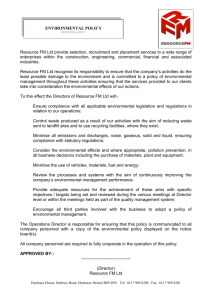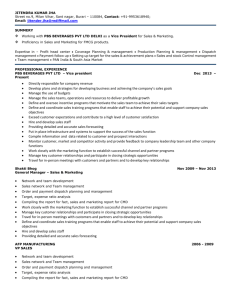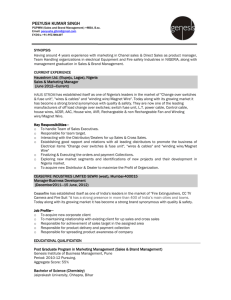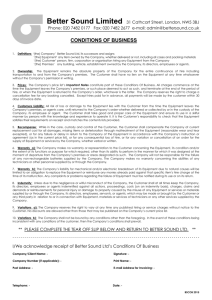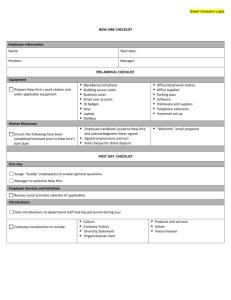bus313 course compact
advertisement
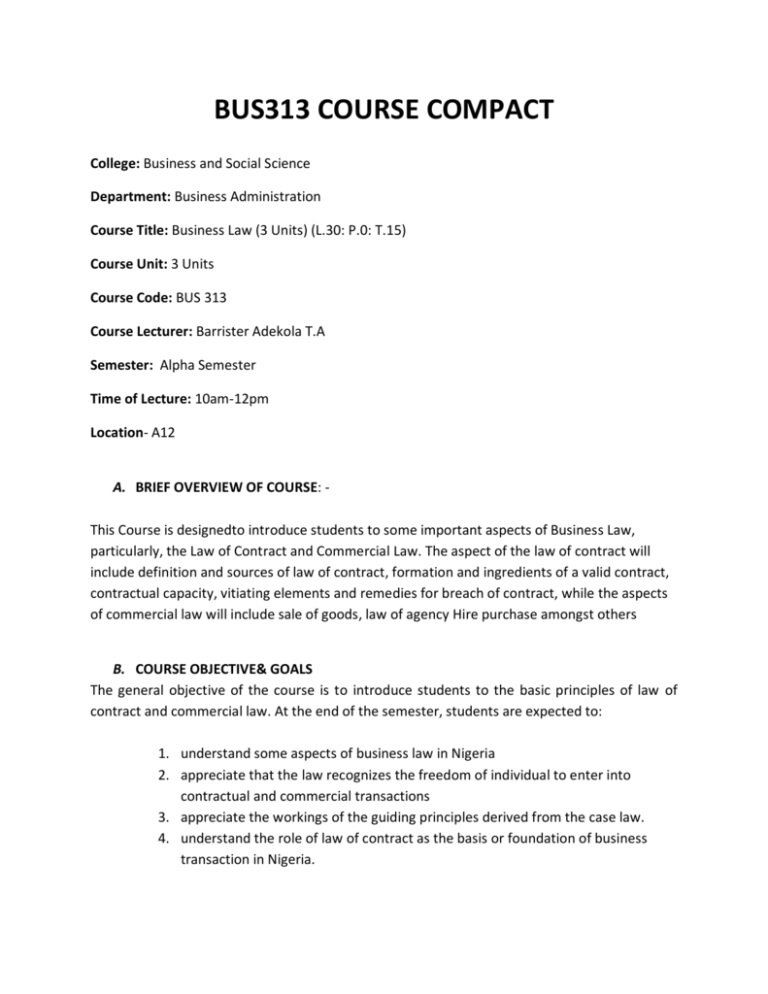
BUS313 COURSE COMPACT College: Business and Social Science Department: Business Administration Course Title: Business Law (3 Units) (L.30: P.0: T.15) Course Unit: 3 Units Course Code: BUS 313 Course Lecturer: Barrister Adekola T.A Semester: Alpha Semester Time of Lecture: 10am-12pm Location- A12 A. BRIEF OVERVIEW OF COURSE: This Course is designedto introduce students to some important aspects of Business Law, particularly, the Law of Contract and Commercial Law. The aspect of the law of contract will include definition and sources of law of contract, formation and ingredients of a valid contract, contractual capacity, vitiating elements and remedies for breach of contract, while the aspects of commercial law will include sale of goods, law of agency Hire purchase amongst others B. COURSE OBJECTIVE& GOALS The general objective of the course is to introduce students to the basic principles of law of contract and commercial law. At the end of the semester, students are expected to: 1. understand some aspects of business law in Nigeria 2. appreciate that the law recognizes the freedom of individual to enter into contractual and commercial transactions 3. appreciate the workings of the guiding principles derived from the case law. 4. understand the role of law of contract as the basis or foundation of business transaction in Nigeria. C. COURSE OUTLINE WEEK 1: Definition, scope and sources of Business law Objective: - . At the end of week 1, students should be able to: explain the meaning and nature of business law. identify the sources of Business Law in Nigeria. analyze the importance of Business Law. Description: - The topic will focus on the following outline The meaning of Business Law. The scope of Business Law. The sources of Nigerian Business Law. Study questions: Discuss the scope of Nigerian Business Law? With the aid of specific examples, examine Legislation as a source of Business Law? WEEK: 2: Classification of Contract Objective: - At the end of week 2, students should be able to: discuss the concept and various classifications of contract. distinguish various classifications of contract. state the importance of each classification under the Nigeria law. Description: - The topic will focus on the outline listed herein under, The definition of contract. The difference between mere arrangement and agreement in law. The importance of the Law of contract. Classification of contract with examples. Study questions. Contracts are classified into various types. Discuss Consider the advantages of written contract over an unwritten It is often said that "not all agreements are contract but all contracts are agreements". Discuss? Cases: Amana suits hotels Ltd. v POP (2007) 6 NWLR (Pt.1 031) 453. Dalek Nig Ltd. v O.M.P.A.D.E,C. (2007) 7 NWLR ( Pi. 1033) 402. Week 3: Elements/Ingredients of a valid Contract. Objective: At the end of week 5, student should be able to provide basic information on: essential elements of a valid contract effect and significance of each element in a formation of contract. Description: The meaning and description of each essential ingredients of a valid contract such as offer, acceptance, intention to create legal relation, consideration and capacity. Effect of each ingredient of a valid contract. Study question: With the aid of relevant authorities differentiate between offer and invitation to treat. List and briefly explain the essential ingredients of a valid contract? Consideration needs not be adequate but must be of real value. Justify the Statement basing your argument on relevancy. Cases: 1 . N.I.C. O.N Hotels Ltd. v None D.C. Ltd. (2007) 13 NWLR (Pt.1051)237 C.A. 2. P.T.F. v W. P. C. Ltd. (2007) 14 NWLR (Pt.1055) 487 3. Shonbanke v Sarki (2006) All FWLR (Pt.292) 131 4. Currie v Misa (1875) L.R. 10 Ex. 153. Week 4: Vitiating elements Description: Meaning of vitiating factors, Types of vitiating factors.( Illegality, mistake, duress, misrepresentation, undue influence, fraud,frustration etc),and The effect of vitiating factor. Objectives: At the end of week 6, student should be able to: explain vitiating elements of a contract identify vitiating elements/factors in a contractual agreement. Analyse the legal status of vitiating elements/factors. Study questions: Briefly examine the effect of misrepresentation in contract? Discuss briefly the differences between fraudulent and innocent misrepresentation? Briefly discuss common and mutual mistake in contract law? Illegal contract is said to be unenforceable. Discuss? Cases: Diamond Bank Ltd. v Ugochukwu (2007) All FWLR (Pt.384) 290 Union Bank of Nigeria Pic. v Omniproducts (Nig) Ltd.(2006) All FWLR (Pt.323) 1726 Nigerian Agricultural and co-operative Bank Ltd. v Salem Farms Ltd (2006) All FWLR (Pt.320)1174 Week 5: Remedies for Breach of contract. -Description: The topic will focus on the- outline: Meaning of breach of contract. Constituents of breach of contract. Remedies for breach of contract. (Damages, specific performance, injunction, recession, Quantum Meruit Objective: At the end of week 7, student should be able to: explain remedies for breach of contract identify some of these remedies. Study question: . Briefly examine remedies available to a party in case of breach of contract? Case: UBA v B. T.L Ind. Ltd. (2007) (Pt.352) 1615 Zenon Petroleum & Gas Ltd. v Idrisiyyah (Nig) Ltd. (2006) All FWLR (Pt.312) Nig.Dynamic Ltd. V Agbocha (2002) FWLR (ptl04)630 C. A Week 6: Definition and Classification of commercial law Description: The topic will focus on the outline: Definition of commercial transaction Classification of commercial transaction a. Sales of goods b. Agency; and c. Hire purchase Objectives: At the end of week 6, student should be able to Know the definition of commercial transaction Understand the various classification of commercial transaction Study questions: Textbook writers define commercial transaction in different ways. Discuss Week 7: Introduction to Sale of Goods: Description: The meaning of sale and agreement to sell under the Sales of Goods laws, Types of goods, The meaning of condition and warranty, Principle of Nemo dat non quad habet and Remedies available to the seller in case ofbreach of condition and warranty. Objectives: At the end of week 7, student should be able to: explain the meaning of sale and agreement to sell differentiate between sale and agreement to sell know the Laws regulating Sale of goods in Nigeria understand the circumstances under which a non-owner can pass valid title to a third party. understand and appreciate remedies available to an innocent party in case of breach of condition and/orwarranty. Study questions: With specific examples, examine the differences between sale and agreement to sell? With reference to the Sale of goods Act, examine the term CONDITION and WARRANTY? A Non-owner can sell property which does not belong to him. Do you agree? What are the remedies available to an innocent party in a contract of sale of goods? Cases: Empil Ltd v Odili (1987) 4NWLR (Pt.67)915. Niblett v Confessionary Materials Co. Ltd (1921) 3 KB 387 Rowland v Divall (1973)2KB 500. . Statute Sale of Goods Act, 1873. Week 9: Introduction to Law of Agency Description: - The topic will focus on the meaning and classification of Agency, classification of agency relationship Objective: - At the end of week 9, student should be able to: explain the meaning of Agency understand laws regulating agency relationship in Nigeria understand and appreciate the rationale behind the creation of agency relationship. Study question what is agency Discuss the classification of agency relationship. How can agency relationship be created. Cases: 0puo V NNPC (2001) 14NWLR (Pt.734) 552 Ofodile V Chinwuba (1993) 1 NWLR (Pt.268)151. Bayero v Mainasara & Sons Ltd (2007) All FWLR (Pt.359) 1285. First Bank of Nigeria Pic. V Excel! Plastic Ind. Limited. (2003) FWLR (Pt.160) 1624. Week 10: Rights and duties of principal and Agent. Objective: - At the end of week 10, student should be able to: explain the meaning of aprincipal and an agent understand the rights of principals and agents in agency relationship. understand and appreciate the duties of a principal and an agent , Description: - Meaning, Rights and Duties of principal and agent in agency relationship. Study questions: Parties to an agreement always have their rights and obligations. Discuss in relation to rights and duties of principal in agency relationship? Cases: Akwara Metal Works & foundry v International Bank For West Africa Limited (2000) FWLR (Pt. 11) 1766. Week 11: Property Law Description : meaning of Lease, Mortgage, Wills and Property transfer Objective: - At the end of week 11, student should be able to: identify and apply the various laws relevant to property law in Nigeria know and understand the transactions contemplated in property law. analyses and appreciate the duties of principal Week 12: Introduction to Hire purchase Objective: - At the end of week 12, student should be able to: understandand explain the meaning of Hire purchase analyse the laws regulating Hire purchase agreement in Nigeria Description: Meaning of Hire purchase Agreement/ contract, Laws regulating Hirepurchase transaction in Nigeria and Creation of Hire purchase contract, and termination of Hire purchase Study question What is Hire purchase? How can Hire purchase be created? Week 13: Introduction to Hire purchase Objective: - At the end of week 13, student should be able to: understand and explain methods of creating Hire purchase analyse methods of termination of Hire purchase agreement. Description: Creation of Hire purchase agreement and termination of Hire purchaseagreement Study question Examine the methods of creating Hire purchase transaction As a Hiree, how can you terminate hire purchase transaction. Week 14:legal environment where business operates Objective: To give opportunity to students to ask questions on all the gray areas in theprevious treated topics Description: examination of basic legal policies that influences business such as: Government transaction Negotiable instrument Insurance Labour - management relations D. Tutorials Based on course outline E. Structure of program/Methods Of Grading Structure of programmed: based on course outline Method of grading- Landmark University Method of grading 1 Attendance 5% 2 Class participation 5% 3 Continuous Assessment 20% 4 Semester Examination 70% 5 Total 100% F. Grand Rules and Regulations Normal Landmark University Rules and Regulations G. Alignment with Goals and vision of Landmark University To produce graduates that will utilize the knowledge of the law to break new grounds H. Contemporary issues/Industry Relevance Commercial agreements have come to be a part of man’s daily activities. While some agreements are legally binding others are not necessarily binding, depending on the intention of the parties to such agreement. For an agreement to be legally binding, some elements need to be present which may be hitherto unknown to the intending parties to contract. It therefore becomes imperative to deal with those important elements in order to distinguish agreements that are legally binding from those that are not. Be that as it may, it is therefore necessary to introduce the students to specific principles guiding the formation of contractual agreements between the parties. I. GENERAL READING LIST: 1. Sanni, A “An introduction to Business Law in Nigeria, with model question and answers” (Malthouse Press Ltd., Lagos, 2005). 2. Dada, T.O “General Principles of Law” (3rd ed. T.O Dada & Co., Lagos, 2006). 3. Alabi, Bolaji, “Business Law in Nigeria’ (BRA Associates, 2003). 4. Sagay, I.E,” Nigeria Law of Contract” (2nd ed., Spectrum Books Ltd, Ibadan, 2000).

